#Oleg Navalny
Text
Incredibly Weak
In the wake of Alexei Navalny’s murder by the Russian fascist state, his message to the Russian people, at the end of the award-winning documentary film Navalny, has been quoted ten thousand times and turned into a meme on social media, to wit:
“If they decide to kill me, we are incredibly strong,” he said, addressing Russian citizens. “The only thing necessary for the triumph of evil, is for…
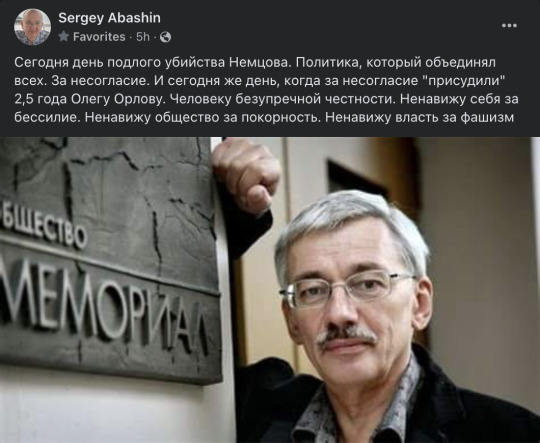
View On WordPress
2 notes
·
View notes
Text
70-year-old oleg orlov who leads Memorial, who freed over 1,000 hostages by exchanging them for himself, sentenced to 2.5 years for discrediting the army; an 87-year-old priest, a pediatrician, and a 70-year-old woman with cousins bombed in ukraine all getting various jail sentences for "discrediting the army", people getting upset at brightly-colored playgrounds or toys for being pro-LGBT; navalny's funeral friday; the neo-nazi rusich battallion confirmed to be actively executing ukrainian POWs. fun week in russian news alone
156 notes
·
View notes
Text
Oleg Orlov began his career by protesting against the Soviet invasion of Afghanistan in the 1980s. At about the same time, he joined Memorial, Russia’s first and most important historical and human-rights organization—in Russia, the two subjects are organically connected—while it was still an underground, dissident operation. In the 1990s, Memorial emerged into the open and began publishing books detailing the mass arrests and murders committed by the Soviet Union. During the decade I spent researching the history of the Soviet Gulag, I ran into Memorial historians and activists all over Russia, including in their one-person “office” in Syktyvkar and in the spectacular museum, now dismantled, that they built on the site of a former concentration camp near Perm.
Memorial is dedicated to both revealing the truth about the past and preventing that past from repeating itself in the future. Its activists work in archives, but they also monitor human-rights violations in modern Russia. Orlov, who became Memorial’s co-chair, worked especially hard to expose the horrors of Russia’s wars in Chechnya, and the cultural and political destruction that followed. He did so because he wanted to live in a different kind of Russia. Now he will pay a high price for his patriotism.
On the eve of Russia’s invasion of Ukraine, the regime shut down Memorial, after 30 years of operation. The same regime arrested Orlov, who had criticized the invasion with the same unsparing language he had used for the previous four decades. “This brutal war,” he wrote in an article, is “not only mass murder of people and destruction of the infrastructure, economy, and cultural sites” of Ukraine but also “a severe blow to the future of Russia,” a country that “is now pushed back into totalitarianism, but this time into a fascist totalitarianism.” Like Alexei Navalny, whose funeral took place in Moscow on Friday, Orlov was extraordinarily brave—brave enough to publish his criticism of the war, of President Vladimir Putin, and of Putin’s regime.
On February 27, Orlov received a two-and-a-half-year prison sentence for “discrediting the Russian army.” Following in a long tradition of Soviet dissidents before him, Orlov made a courtroom speech, addressed to those in the room and beyond. Joseph Brodsky, who later won the Nobel Prize in Literature, sparred in 1964 with a Soviet judge who asked him by what right he dared state “poet” as his occupation: Who ranked you among poets?” Brodsky replied, “No one. Who ranked me as a member of the human race?” That exchange circulated throughout the Soviet Union in handwritten and retyped versions, teaching an earlier generation about bravery and civic courage.
Orlov’s speech will also be reprinted and reread, and someday it will have the same impact too. Here are excerpts, translated by one of his colleagues:
On the first day of my trial, terrible news shocked Russia and the entire world: Alexey Navalny was dead. I, too, was in shock. At first, I even wanted to give up on making a final statement. Who cares about words today, when we have not recovered from the shock of this news? But then I thought: These are all links in the same chain. Alexey’s death or, rather, murder; the trials of other critics of the regime including myself; the suffocation of freedom in the country; the invasion of Ukraine by the Russian army. So I have decided to speak.
I have not committed any crime. I am being tried for writing a newspaper article that described the political regime in Russia as totalitarian and fascist. I wrote this article over a year ago. Some of my acquaintances thought back then that I had exaggerated the gravity of the situation.
Now, however, it is clear that I did not exaggerate. The government in our country not only controls all public, political, and economic life, but also aspires to exert control over culture and scientific thought … There isn’t a sphere of art where free artistic expression is possible, there are no free academic humanitarian sciences, and there is no more private life either.
Orlov continued by reflecting on the absurdity of his case, of the legalistic rigamarole in Russia that conceals the regime’s lawlessness. In fact, the law is whatever Putin dictates. Everything else, the lawyers, prosecutors, and judges, are just there for show, to pretend that there is rule of law when there is not.
Let me now speak about my current trial. When it began, I refused to participate. Thanks to that, I had the opportunity to reread The Trial, a novel by Franz Kafka, during the court sessions. The current situation in our country has a lot in common with the world that Kafka’s protagonist inhabits in the book. We live with the same absurdity and arbitrariness, camouflaged by a formal adherence to some pseudo-legal procedures.
Here we are accused of “discrediting the military,” but no one explains what this means or how it differs from legitimate criticism. We are accused of “spreading deliberately false information” without anyone bothering to prove that it is indeed false. The Soviet regime used exactly the same methods when it branded any criticism as lies. Our attempts to prove the veracity of this information are punished as crimes … We are being given prison sentences for doubting that aggression against a neighboring country is being carried out for the sake of international peace and security.
This is absurd.
Kafka’s hero has no idea, until the end of the novel, of the nature of the accusation against him. He is ruled guilty and executed anyway. In Russia, the accusation is formally announced, but it is impossible to understand it within the framework of law and logic. Unlike Kafka’s hero, we do understand why we are being detained, arrested, sentenced, or killed: We are being punished for daring to criticize the authority. That is completely banned in modern Russia.
Orlov listed a few of the thousands of Russians who have been detained for criticizing the Russian government and the war, and then continued:
In recent days, they have grabbed, punished, and even imprisoned people only for coming to memorials to victims of political purges to pay tribute to the murdered Alexey Navalny, a remarkable man, brave and honest. He never lost optimism and faith in our country’s future even in the extremely hard conditions that had been set up especially for him.
The authorities are fighting against Navalny even when he is dead; they are afraid of him even after his death, and they are right to be afraid. They are destroying people’s memorials to his memory. They do this because they hope to demoralize that part of the Russian society that still takes responsibility for their country. This is a false hope.
We remember Alexey’s appeal: “Don’t give up.” I will add to this: Don’t lose your spirits, don’t lose your optimism. The truth is on our side. Those who have led our country into this hole represent the old, the frail, the outdated. They do not clearly see the future, only false images from the past, mirages of “imperial grandeur.”
Finally, Orlov addressed the court itself, the government officials and clerks, the judges, and the prosecutors. Of course, he knows, as any student of Soviet history knows, that a single dictator cannot enforce an authoritarian regime by himself. Thousands of collaborators are required. Orlov’s last words were for them.
Not all of you believed in this repressive system, of course. You sometimes regret that you are forced to participate in all of this. But you tell yourself: And what can I do? I am only following the instructions from my superiors. The law is the law.
I am speaking to you, your honor, and the others accusing me: Are you yourselves not afraid? Are you not afraid to watch what our country is becoming, our country that you, too, probably love? Are you not afraid that not only you, but also your children and, God forbid, your grandchildren, will have to live in this absurdity, this dystopia?
Do you not acknowledge the obvious truth, that the repressive machine will sooner or later also flatten those who launched it and promoted it? This has happened many times in history …
I am not completely sure that those who have created and implemented Russia’s illegal, anti-constitutional “laws” will face judicial persecution. But the punishment will definitely come. Your children or grandchildren will be ashamed to talk about the work and the deeds of their fathers, mothers, grandfathers, and grandmothers. The same will happen to those now committing crimes in the Ukraine. This, I think, is the most terrible punishment. And it is inevitable …
I regret nothing.
7 notes
·
View notes
Text
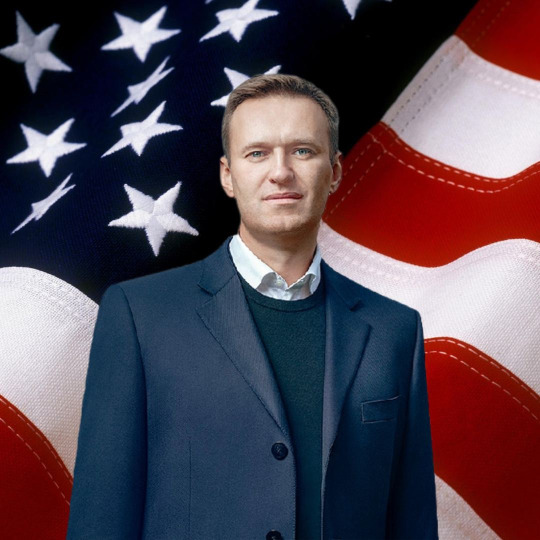
« Je n’aime pas sa bouche de travers, sa femme desséchée et tirée à quatre épingles, ses enfants, ses excellentes photographies et son photographe, ses convictions, son argent de trouble origine, l’expression dégoûtée de son visage, son lourd squelette américanoïde, ses chemises, sa démagogie… Un faux derche, un cafard, une balance, un requin.
Navalny est un bourgeois moderne typique, une ordure, en un mot. Et une ordure d’un nouveau type — un néo bourgeois.
Son père soviétique — un sacré renard — avocat militaire, l’un des principaux avocats de l’armée, — a donné naissance à ces deux hommes : Oleg et Alexey. Une mauvaise race est apparue, un type de personnes étranger à la Russie…
Un étranger, en un mot, qui n’est pas des nôtres. Et il n’a pas de nuque. »
Édouard Limonov, LiveJournal, 29 avril 2018
7 notes
·
View notes
Text

Alexei Navalny's wife, Yulia Navalnaya, addressed the news of his presumed death today at an international conference in Münich. The pain for Navalny's family today is unbearable. Please keep Yulia, Daria, Zahar, Navalny's parents, and his brother Oleg Navalny in your thoughts and prayers. And our leaders must now hold Russia fully accountable for this endless list of despicable crimes.
#alexei navalny#yulia navalnaya#putin is a terrorist#stop terrorism#russian dissident#rest in peace#russia#munich
2 notes
·
View notes
Text
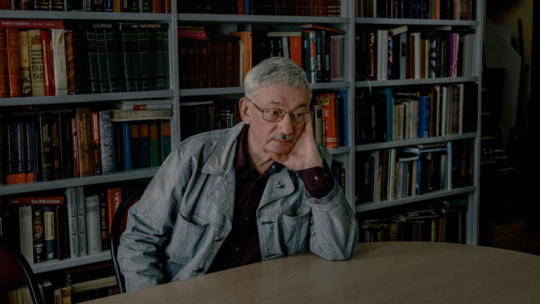
Oleg Orlov, a leading human-rights activist, at the Human Rights Center Memorial in Moscow, Russia, on May 17, 2023.
‘We Are Being Punished for Daring to Criticize the Authority’
‘We Are Being Punished for Daring to Criticize the Authority’ (msn.com)
Opinion by Anne Applebaum
"On February 27, Orlov received a two-and-a-half-year prison sentence for “discrediting the Russian army.” Following in a long tradition of Soviet dissidents before him, Orlov made a courtroom speech, addressed to those in the room and beyond. Joseph Brodsky, who later won the Nobel Prize in Literature, sparred in 1964 with a Soviet judge who asked him by what right he dared state “poet” as his occupation: Who ranked you among poets?” Brodsky replied, “No one. Who ranked me as a member of the human race?” That exchange circulated throughout the Soviet Union in handwritten and retyped versions, teaching an earlier generation about bravery and civic courage.
Orlov’s speech will also be reprinted and reread, and someday it will have the same impact too. Here are excerpts, translated by one of his colleagues:
On the first day of my trial, terrible news shocked Russia and the entire world: Alexey Navalny was dead. I, too, was in shock. At first, I even wanted to give up on making a final statement. Who cares about words today, when we have not recovered from the shock of this news? But then I thought: These are all links in the same chain. Alexey’s death or, rather, murder; the trials of other critics of the regime including myself; the suffocation of freedom in the country; the invasion of Ukraine by the Russian army. So I have decided to speak.
I have not committed any crime. I am being tried for writing a newspaper article that described the political regime in Russia as totalitarian and fascist. I wrote this article over a year ago. Some of my acquaintances thought back then that I had exaggerated the gravity of the situation.
Now, however, it is clear that I did not exaggerate. The government in our country not only controls all public, political, and economic life, but also aspires to exert control over culture and scientific thought … There isn’t a sphere of art where free artistic expression is possible, there are no free academic humanitarian sciences, and there is no more private life either.
[Read: How I lost the Russia that never was]
Orlov continued by reflecting on the absurdity of his case, of the legalistic rigamarole in Russia that conceals the regime’s lawlessness. In fact, the law is whatever Putin dictates. Everything else, the lawyers, prosecutors, and judges, are just there for show, to pretend that there is rule of law when there is not."
READ MORE ‘We Are Being Punished for Daring to Criticize the Authority’ (msn.com)
0 notes
Text
Fabio Massimo Castaldo
Nella Russia di Putin il dissenso continua a essere represso con sempre maggiore ferocia, quasi sempre con il carcere e, purtroppo, anche con la vita.
Stavolta a finire nel mirino del Cremlino è stato il dissidente Oleg Orlov, già copresidente della fondazione Memorial vincitrice del Premio Nobel per la pace nel 2022. È stato condannato a due anni e mezzo di carcere con l’accusa surreale di aver ripetutamente denunciato l’aggressione della Russia all’Ucraina.
Noi abbiamo il dovere di alzarci in piedi e di schierarci sempre dalla parte di tutti quegli oppositori, giornalisti e dissidenti che non si fanno mettere in ginocchio dalla strategia del terrore di Putin e che, con coraggio, continuano a combattere in nome della libertà e della democrazia.
E mi chiedo dove siano i pacifisti nostrani, sempre pronti a soluzioni propagandiste a colpi di slogan, a strapparsi le vesti contro gli aiuti militari, ma che non proferiscono MAI parola quando un pacifista russo viene arrestato per aver espresso il dissenso nei confronti di Putin e dei suoi fedelissimi.
È nostro compito continuare a denunciare queste ingiustizie inaccettabili. È nostro compito condannare sempre le atrocità che il regime di Putin continua a perpetrare. È nostro compito, ancora, supportare attivamente gli oppositori e la società civile Russa. È nostro compito mettere in campo azioni concrete per la liberazione di tutti quegli oppositori imprigionati dal regime, come Vladimir Kara-Murza. Quanti altri Navalny dobbiamo ancora piangere?
Agiamo ora!
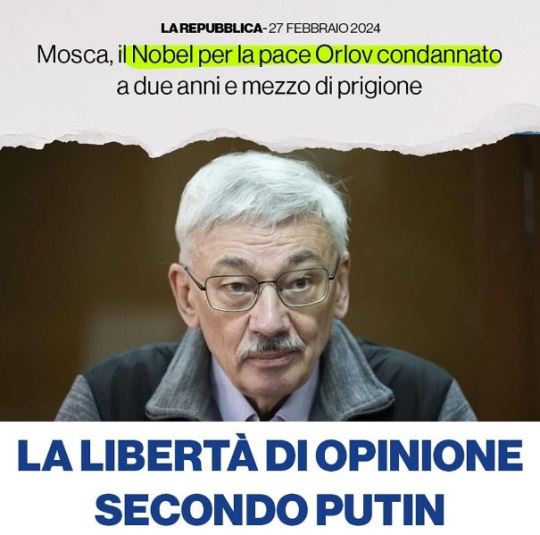
0 notes
Text
Ucrania.
💊 Austria y Hungría, crítica que se haya abierto el debate de posible envío de tropas a Ucrania. Hungría, ni tropas, ni armamento.
💊 Según... Corea del norte, envío a Rusia, 6700; contenedores con equipos militar y 3; millones de proyectiles de artillería. Colocando a Rusia, con una superioridad en ventaja 10; a 1; en artillería.
Aunque yo agrego que por cada 1; ucraniano caído en combate hay 8; rusos.
💊 Zelenski, recordó el retraso en el apoyo y advirtió, "si no obtenemos apoyo, no tendremos nuevos éxitos para éste año"
También celebró que occidente hable de una intervención directa.
💊Rusia, desmiente la información de canje de Navalny.
💊Rusia, responde a Macron, que enviar tropas a Ucrania, no le conviene a occidente.
💊 Rusia, condena al premio Nobel de la paz (2022) Oleg Orlov, a 2; años con 6; meses de prisión.
💊Tomen nota: "Arabia Saudí, condena y ejecuta en un día a 7; personas, según por traición y terrorismo.👈👀👁️
💊Tomen nota: "Desplazados somalíes sin un lugar donde volver👈👁️👀.
💊Biden (EEUU) se muestra optimista por un cese al fuego en Gaza, para próximos días.
💊"La sombra de una guerrera civil acecha a Haití". 👀
💊"Votar es utilizar tú voz para ser escuchado y es el aspecto más definitorio de nuestra democracia" Lo dice
Mónica Lewinsky, quien protagonizó el escándalo del sexo oral que hundió al expresidente estadounidense
Pinocho Clinton. 😁
💊Se tenía que decir y se dijo, lo dijo Macron, enviar tropas a Ucrania. Ahora el debate.
0 notes
Photo
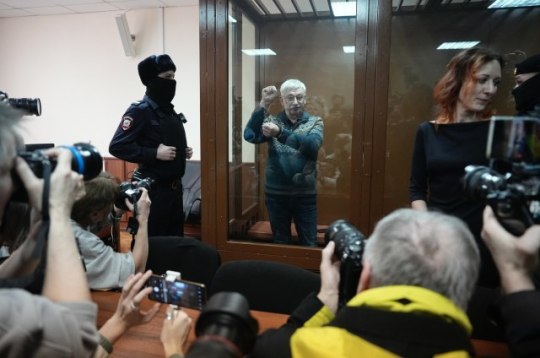
Opinion | ‘Our Country Is Sinking Into Darkness’: Oleg Orlov’s Final Word in Court
On the day this trial began, Russia and the world were shocked by the terrible news of Alexei Navalny's death. I was shocked, too. I even considered not making a final statement at all. What is there to say when we are still reeling from the shock of the news? But then I thought: Actually, these are all links in one chain — the death, or rather the murder, of Alexei Navalny; judicial reprisals against other critics of the regime, including me; the stifling of freedom in the country; and the deployment of Russian troops in Ukraine. These are all links in the same chain. And so I decided to say my final word after all.
The views expressed in opinion pieces do not necessarily reflect the position of The Moscow Times.
Read more | Subscribe to our channel
0 notes
Link
[ad_1] The United Kingdom on Thursday lifted sanctions against the exiled former banking tycoon Oleg Tinkov. The decision was announced just days after British billionaire Richard Branson called on his government to lift the “unwarranted” sanctions imposed against Tinkov last year. Allies of jailed Kremlin critic Alexei Navalny had also previously urged London to lift sanctions against the businessman. Britain’s Treasury said it removed Tinkov’s name from its sanctions list, adding that he was “no longer subject to an asset freeze or trust services sanctions.” Britain imposed asset freezes and travel bans on Tinkov alongside other Russian figures in March 2022 on accusations that they supported Russia’s invasion of Ukraine. Yet Tinkov was among the few Russian oligarchs to openly condemn Moscow’s invasion of Ukraine last spring. In comments made to British media earlier this week, Tinkov touted his liberal credentials and opposition to the Kremlin. “The sanctions are unfair — they should never have happened — and not because of what I said after the invasion but of what I did before. I was probably the most liberal businessman in Russia,” he said. The former banker complained that the sanctions impaired his treatment for a rare form of leukemia by a London cancer specialist. Tinkov renounced his Russian citizenship last October in opposition to the war in Ukraine. In 2013, he renounced his U.S. citizenship in what U.S. authorities said was an attempt at tax evasion. The Russian billionaire is known for founding the fast-growing Tinkoff Bank in 2006. Tinkov sold his 35% stake in the group that owns Tinkoff Bank in April 2022, claiming the Kremlin forced him to do so after he condemned Russia’s invasion. [ad_2]
0 notes
Text
"Focus": The Lesson of Shiyes
Dmitry Sekushin. Photo courtesy of 7×7
Hi!
This is the 7×7 team on the line. This newsletter has been written by Oleg Gradov. What inspired the environmental protests at Shiyes and why there is no mass protest nowadays is the subject of our newsletter today.
Approximate reading time: 4 minutes.
I’m sorry if you’re from Moscow and our headline hurts your feelings. No one will be scolding the…

View On WordPress
#23 January 2021 pro-Navalny protests#7X7 (Russian web publication)#Arkhangelsk Region#Dmitry Sekushin#Marina Feldt#Oleg Ogradov#Pomors#pro-war Russians#Russian anti-war movement#Russian environmentalists#Shiyes
0 notes
Text
House Arrest Of Navalny Associates Replaced With Milder Restrictions
House Arrest Of Navalny Associates Replaced With Milder Restrictions
(Article text ©2021 RFE/RL, Inc., Radio Free Europe/Radio Liberty – rferl.org – MOSCOW, April 8, 2021 – article text also appeared at rferl.org/a/house-arrest-of-navalny-associates-replaced-with-milder-restrictions/31192851.html)
The house arrest of the brother of jailed Russian opposition politician Aleksei Navalny, a close associate, and two Moscow municipal lawmakers who are charged with…
View On WordPress
#Courts#Human Rights#Navalny#Nonprofits#Oleg Navalny#Opposition#Politics#Prosecutions#Protests#Russia#Slider
1 note
·
View note
Photo

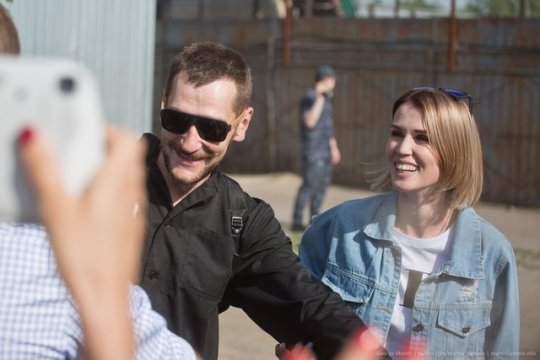
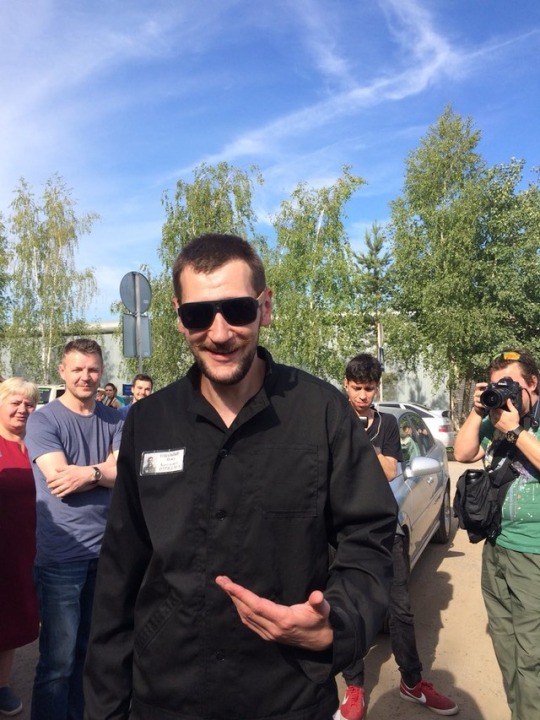
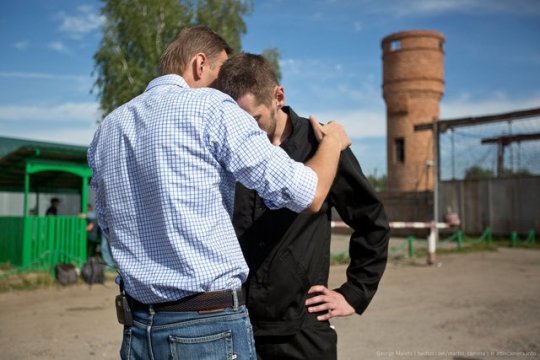
For those keeping track, this is how you go free from 3.5-year political imprisonment. Oleg Navalny is out, y'all.
Олег Навальный свободен.
0 notes
Text
Thousands of mourners gathered in Moscow on Friday for the funeral of Russian opposition leader Alexei Navalny, despite an ominous warning from the Kremlin that anyone participating in unsanctioned gatherings could face arrest.
Crowds of people, many clutching red carnations, gathered amid a heavy police presence to pay their respects to the Kremlin foe, with some chanting “Putin is a killer” and “you weren’t afraid, we aren’t afraid.”
More than 400 people have been detained in dozens of cities across Russia for participating in memorials in the two weeks since Navalny’s sudden and still unexplained death in a Russian penal colony in the Arctic Circle, according to OVD-Info, which monitors politically motivated arrests in Russia. At least 115 people were detained on Friday, according to the group.
Navalny, who was 47 years old, was buried in Borisovo cemetery in his childhood neighborhood in southeast Moscow. The casket of the Putin critic, who was known for his irreverent sense of humor, was lowered into the ground to Frank Sinatra’s “My Way” followed by the theme tune from his favorite film, Terminator 2.
Navalny’s sudden death has fueled concerns about the well-being of hundreds of other prisoners in Russia.
“If they could kill Navalny, they could kill anybody else,” said Grigory Vaypan, a senior lawyer at Memorial, Russia’s oldest human rights group.
There are currently 679 people serving sentences on politically motivated charges, according to Memorial, although the actual number is likely much higher, Vaypan said.
“This number is the absolute minimum. It’s the most conservative assessment that we can get,” he said.
Despite the international outcry over Navalny’s death, Moscow’s crackdown on dissent shows little sign of abating.
On Feb. 27, Oleg Orlov, chairman of Memorial, was sentenced to 2.5 years in prison for criticizing Russia’s war in Ukraine. Two days later, a court in Sverdlovsk rejected the appeal of a Russian American, Ksenia Karelina, who was detained on treason charges earlier this year for donating just over $50 to a Ukrainian charity.
The Kremlin’s crackdown on dissent has gathered pace throughout Russian President Vladimir Putin’s 24 years in power, escalating dramatically in the wake of the annexation of Crimea in 2014. The number of people in prison on politically motivated charges has increased 15-fold over the past decade, Vaypan said, with arrests surging further still since the full-scale invasion of Ukraine in 2022.
In 2022, more than 21,000 people were penalized for publicly opposing the war and faced detention and heavy fines, according to Amnesty International.
Shortly after the invasion, Putin signed a new law that prohibits the “discreditation” of the Russian Armed Forces and the dissemination of so-called fake news about the country’s military. The law has been used widely to target critics of the war.
Last year, a court in Moscow sentenced 63-year-old railway worker Mikhail Simonov to seven years in prison for making anti-war statements on the Russian social media platform VKontakte. “While killing children and women, we sing songs on Channel One [Russian state TV],” Simonov wrote. “We, Russia, have become godless. Forgive us, Lord,” Simonov wrote in a post.
“The approach is to target one person to create a chilling effect for another 1,000 or 10,000 people,” Vaypan said, of the haphazard way the law has been applied. “No one ever knows who is going to be targeted for what and who is going to be let off the hook,” he said.
The length of sentences has also increased dramatically in recent years. In 2023, dissident and Washington Post columnist Vladimir Kara-Murza was sentenced to 25 years in prison for condemning the war in Ukraine. Natalia Arno, president of the Free Russia Foundation, described the sentence as reminiscent of those handed down to dissidents in the Stalin era.
With Navalny dead, Kara-Murza, a dual British-Russian citizen, is now the most prominent Kremlin critic imprisoned in Russia. “We understand that Kara-Murza is next, and he is very high on Putin’s target list,” said Arno, a friend of the jailed Putin foe.
Kara-Murza has survived two near-fatal poisoning attempts that have left him with lingering health issues and amplified concerns about his well-being in the Russian prison system, where health care is notoriously poor.
Conditions in Russian prisons are equally grim. A 2021 State Department report described the country’s detention centers and penal colonies as “often harsh and life threatening,” noting that food and sanitation standards were low while overcrowding and abuse were rife.
A striking number of Russia’s political prisoners have been convicted on religious grounds. Their cases receive significantly less attention both within Russia and abroad. Almost two-thirds of the people considered political prisoners by Memorial have been persecuted because of their religious beliefs.
Many are adherents of Hizb ut-Tahrir, an international Islamist political organization that Russia deemed a terror group in 2003.
As with other politically motivated cases, Hizb ut-Tahrir followers were previously sentenced to two- to three-year prison terms, said Alexander Verkhovsky, director of the Sova Center, a Moscow-based think tank that studies nationalism and racism, but in recent years they have been handed down sentences of up to 24 years.
Jehovah’s Witnesses, which Russia labeled an extremist group in 2017, have also borne the brunt of an inexplicable and punishing crackdown.
Since 2017, there have been over 2,000 raids on Jehovah’s Witnesses, with 794 people facing charges, according to Jarrod Lopes, a spokesperson for the Jehovah’s Witnesses in the United States. Many of those facing charges are older adults; the trial of the oldest, 85-year-old Yuriy Yuskov, began in January.
On Thursday, a 52-year-old man in the Russian city of Tolyatti, Aleksandr Chagan, was handed an eight-year sentence for his membership in the church.
“We’ve noticed that the Russian authorities haven’t slowed down in religious persecutions. If anything, lately, things have continued to escalate,” Lopes said.
5 notes
·
View notes
Note
Oleg Navalny is so cute 🥵
@perfectpiety is this you ?!!!??
ajskshskshshsh i mean he once did fanart of till lindemann from rammstein and the art he did when he was in prison a few years back was real cool so…there’s that ???
#this has the same energy as the asks i got name dropping taulant xhaka#anonymous#answered#never a dull moment on ihc
2 notes
·
View notes
Link
Vladimir Kara-Murza, twice poisoned by the Putin regime, asks why America still has not implemented the Magnitsky Act against Putin’s cronies.
While he writes, Lyubov Sobol has fled Russia (Kara-Murza announced her as the winner of the Magnitsky Award in 2019), Kira Yarmysh remains under house arrest, Leonid Volkov and Ivan Zhdanov have also fled Russia, and Oleg Navalny has been sentenced in court.
I have not even mentioned the poisoning, false arrest, and baseless imprisonment of Oleg’s brother, Alexei Anatolyevich.
The United States can either support democracy and the rule of law in Russia, or it can continue to hold out hopes that Putin might become ‘constructive’. If that is President Biden’s position, then he is deluding himself. Surely the rule of law must come before diplomatic political correctness?
I have written to a member of the House of Lords in my country to demand Magnitsky Sanctions against Putin’s enablers, particularly those living in Britain. We shall see whether the British Parliament moves on this issue, or whether we shall continue to hear disheartening news about suppression and persecution in Russia.
#Vladimir Kara-Murza#oleg navalny#imprisonment#vladimir#vladimir oblast#prison#false accusations#lyubov sobol#kira yarmysh#alexei navalny#free navalny#ivan zhdanov#leonid volkov#russian politics#injustice#persecution#russian federation#president biden
2 notes
·
View notes